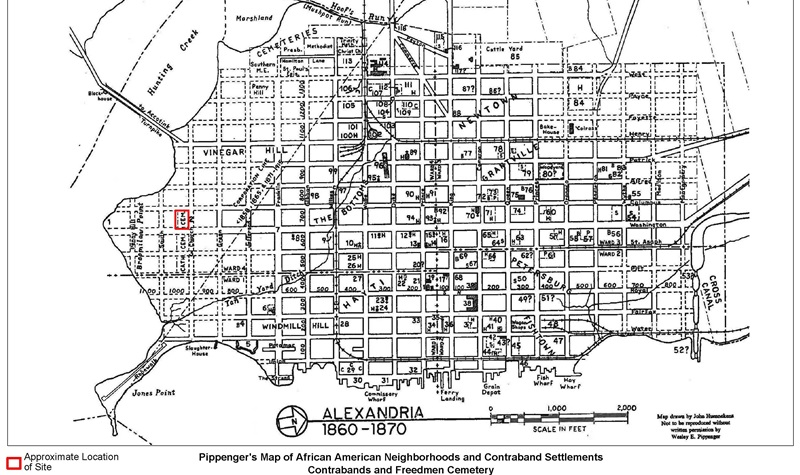
Cemetery: The Book of Records
Cemetery: The Book of Records
Personal Record of Deaths
1864 Name Ages
Yrs Mos Days
Place of Residence, etc March 26 Mary Grandison 27 Grantville “ “ Georgianna Hawkins 4 Newtown March 27 Amanda Miner 1 12 Coal Wharf “ “ Anna Honor 3 Water Street Book of Records, March 26-27 1864[i]

In October 1862, Reverend Albert S. Gladwin, who had arrived in Alexandria the previous May, began performing the duties of Superintendent of Contrabands, a position to which he was officially appointed in early May 1863.[ii] One of the responsibilities of the superintendent was recording deaths, burials, and marriages of the many freedom-seekers living in the city. The information gathered was listed in the Book of Records, Containing the Marriages and Deaths That Have Occurred, Within the Official Jurisdiction of Rev. A. Gladwin: Together with any Biographical, or Other Reminiscence that may be Collected, Alexandria, Va, (herein referred to as the Book of Records, often called the Gladwin Record). The document opens with a tally sheet of the number of freedom-seekers dying in Alexandria beginning in April 1862, about six months before the arrival of Gladwin. The tally continued through December 1865, marking the deaths of 2,398 people (incorrectly calculated as 2448 or 2,498).[iii]
In March 1863, administrators under the direction of Gladwin commenced to list the names of the deceased, ages, dates and places of residence and/or death, and sometimes, the causes of death and next of kin. Notes occasionally refer to a specific place of burial (other than Freedmen’s Cemetery) and to the officiant at a funeral.[iv] The change in policy left a legacy that honored and recognized the individuality and dignity of the African American individuals who lost their lives in Alexandria during the war.
After Gladwin’s departure in January 1865, management of the cemetery, including documentation in the Book of Records, continued under Reverend James Inglish Ferree, a captain in the Union Army, who replaced Gladwin as Superintendent of Contrabands.[v]
The Freedmen’s Bureau took over administration in July 1865.[vi] A succession of Superintendents of Freedmen, including Captain Henry Elijah Alvord and Major Samuel Perry Lee, assumed management duties and continued the list of names.[vii] Reverend Eliphalet Owen maintained the list throughout Gladwin’s tenure and into the initial period of management by the Freedmen’s Bureau until September 30, 1865 when there is a clear change in the handwriting of the keeper of the Book of Records.[viii] On January 1, 1866, the Freedmen’s Bureau continued administration with a “New System” of recording that included information on the payment for funeral expenses.[ix]
By the time of the final entry in the Book of Records, the names of almost 3,000 individuals had been written down for posterity. This tabulation includes the deaths of 1,711 people interred in Freedmen’s Cemetery between March 1864 and January 1869, from the time of the first burials there until the federal government gave up its administration with the winding down of operations of the Freedmen’s Bureau in Virginia at the end of 1868.[x] As documented in the Book of Records, Betsey Cranklin lost three children in the summer of 1866 while living at Sickel Barracks. Five-month-old Lillie Sanders and her mother, Betty Sanders, herself only nineteen, died at 77 Henry Street in 1868. Residing opposite L’Ouverture Hospital on Prince Street, Milly Fanteroy and her two-month-old daughter, Virginia, died within days of each other in September 1864.[xi] Eighty-year-old Millie Bailey, who passed away on January 12, 1869, was the last name listed in the Book of Records.[xii]
The recording of the poignant details of the lives and passing of so many refugees like Cranklin, Sanders, Fanteroy, and Bailey, who did not live long in freedom, serves not only to memorialize individual freedom-seekers, but also to provide information for historians and others seeking an understanding of the lives and challenges facing African American individuals in Alexandria during the war and in the post-war years. Notations pinpointing the places of death provide insight into the neighborhoods that developed in Alexandria. The document also gives researchers demographic details that increase our understanding of health issues facing the community where the most vulnerable, children under the age of five, appeared to have the highest mortality rate. Most importantly, the list of names has allowed genealogist Char McCargo Bah to connect the past with the present by identifying descendants, i.e., living relatives, of more than 150 individuals buried in the cemetery.

Source: Book of Records, p.9, Library of Virginia, Richmond
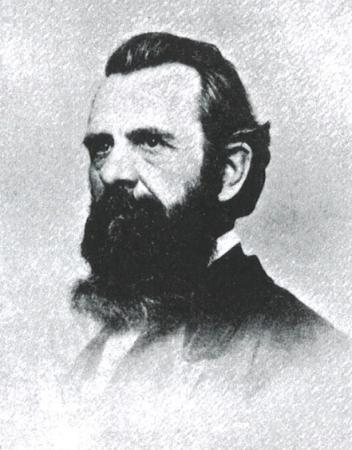
Source: Ralph Dornfeld Owen, Descendants of John Owen of Windsor, Connecticut (1622-1699), A Genealogy (Philadelphia: 1941)
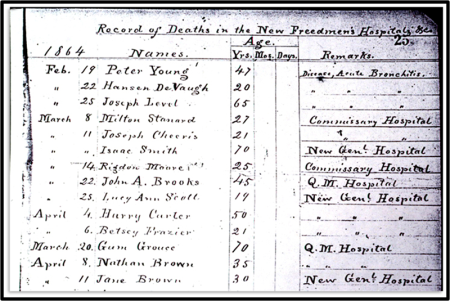
Source: Book of Records, p.25, Library of Virginia, Richmond
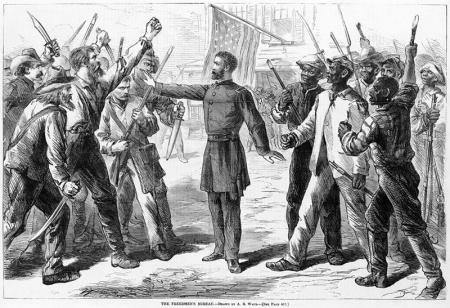
Source: A.R. Ward, artist, The Freedmen's Bureau, Harper's Weekly, July 25, 1868, p. 473, Library of Congress, Washington, D.C.
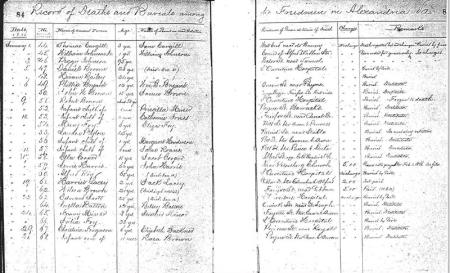
Source: Book of Records, pp.84-84, Library of Virginia, Richmond
The Names – Connecting the Past with the Present
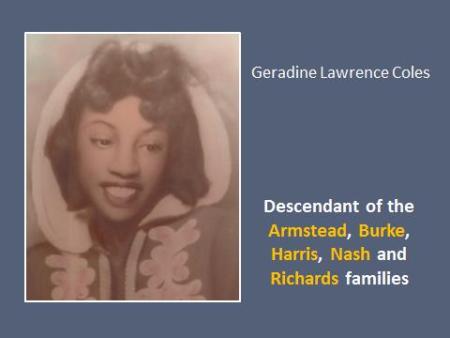
Source: Char Bah, Journey to be Free: Descendants Returning Home to Alexandria, Program for National Civil War Project, March, 2014.
The significance of the Book of Records stems from the detailed information it provides about African American individuals living in Alexandria during and immediately after the war. Historian Wesley Pippenger discovered the document in the archives at the Library of Virginia in Richmond in 1995 and immediately recognized its value. Pippenger transcribed and published the full record with the names of the deceased listed in alphabetical order to facilitate their use by genealogical researchers.[xiii] In addition, he included some names drawn from other historical sources, notably an 1865 memorandum book, to supplement the information in the Book of Records.
Genealogist Char McCargo Bah used the names listed in Pippenger’s transcriptions of the Book of Records as a starting point to find the descendants of those who passed away during or immediately after the war – primarily the freedom-seekers who came to the city, but perhaps also African American people living in the city when the war broke out. By 2019, using census information, birth and death records, marriage certificates, and other primary documents, Bah had identified more than 170 individuals listed in the Book of Records with descendant families living as far afield as California and Arizona, as well as those who still reside in Alexandria today.[xiv] More than 150 were among those buried in Freedmen’s Cemetery between March 1864 and January 1869.
Statistical Analysis and Mortality
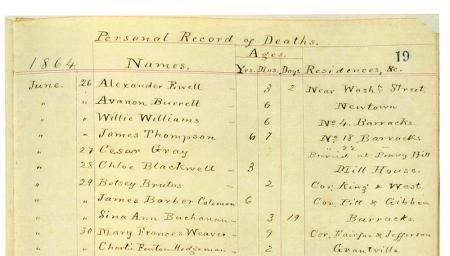
Source: Book of Records, p.19, Library of Virginia, Richmond
Analysis of the causes of fatality and ages of death in the Book of Records provides a glimpse into the health problems that resulted from the difficult journeys and unfortunate living conditions of the freedom-seekers. As might be expected, children, especially the very young, were among the most vulnerable in the population. More than half of those buried in Freedmen’s Cemetery whose ages were recorded were children under the age of 16. Of the known ages, babies and children under the age of five had the highest mortality rate.[xv] Forty-six stillborn infant, most with no given name, were noted in the Book of Records. The perception and memory of the high infant mortality rate persisted until well after the war, as an Alexandria Gazette article in 1894 reported that the cemetery held mostly “colored children, generally infants,” the “spot of ground…studded with shingles bearing the[ir] names…many but a few days old and others only as many hours.”[xvi] The oldest persons listed in the Book of Records were Daphne Allen, Massey Molton, John Smith, and Polly (with no surname), all 100 years of age.[xvii]
Fewer than four percent of the entries in the Book of Records recorded the cause of death,[xviii] and smallpox was rarely mentioned, despite the historical accounts of its prevalence. The absence of the mention of smallpox as a cause of death may also be an indication that smallpox victims could have been buried elsewhere, although the small number of names with a recorded cause of death precludes any definitive statement about this issue. Other significant fatal diseases included typhoid and other intestinal disorders and infectious fevers, such as dysentery, acute bronchitis, pneumonia and pleuro-pneumonia, consumption (tuberculosis), and “miasmatic fever,” which described diseases such as cholera that were believed to be caused by pollution or “bad air.”[xix]
The official monthly report showed that more deaths occurred, or were recorded, in the first seven months (March-August 1863) of Gladwin’s tenure than at any other time during the period of recordation. The tabulations document that initially, more deaths occurred during the winter months, particularly from October to January. As the war raged on, more deaths occurred in the summer of 1864 than in the colder months, perhaps because of perpetually unsanitary living conditions, lack of nutritional food, spread of diseases, and numbers of USCT with battle wounds and disease.[xx]
Neighborhoods
Historians have studied the notations that document the places of death in the Book of Records to achieve an understanding of where the formerly enslaved and freedpeople were residing during and immediately after the tumultuous years of the Civil War. Many of the recorded deaths took place at medical infirmaries such as L’Ouverture Hospital or at the various Contrabands’ barracks. Given the horrendous living conditions described by aid workers and others at the so-called “Slave Pen,” previous home to the notorious businesses that prospered during the domestic slave trade, it should perhaps come as no surprise that the Book of Records cited this location (now Freedom House Museum, 1315 Duke Street) 24 times as a place where the newly arrived freedom-seekers had passed away.[xxi] However, the majority of the recorded deaths occurred in newly established freedmen’s neighborhoods such as Grantville, Newtown, Washington Square, Petersburg, and Vinegar Hill, with some in the pre-war neighborhood of Hayti. Individual streets were also called out in the document—Alfred Street, St. Asaph Street, Cameron Street, Columbus Street, Commerce Street, Duke Street, Franklin Street, Fairfax Street, Water Street, West Street, Wilkes Street, and Wolfe Street.[xxii] Using this locational information, Pippenger created a map of the African American communities in Alexandria.[xxiii] Additional study may further connect these original community locations to later African American neighborhoods and changes in their composition through time. Certainly, Petersburg, now called “The Berg,” has retained its wartime identity for more than 150 years.

Source: Wesley Pippenger, Alexandria, Virginia Death Records 1863-1868 (The Gladwin Record) and 1869-1896 (Westminster, MD: Family Line Publications, 1995).
Footnotes
[i] Book of Records, Containing The Marriages and Deaths That Have Occurred, Within The Official Jurisdiction of Rev. A. Gladwin: Together, With any Biographical or Other Reminiscences That may be Collected. Alexandria, Va, Library of Virginia, Richmond, VA, Accession Number 1100408, March 26-27, 1864, 13.
[ii] Book of Records, Containing The Marriages and Deaths That Have Occurred, Within The Official Jurisdiction of Rev. A. Gladwin: Together, With any Biographical or Other Reminiscences That may be Collected. Alexandria, Va, Library of Virginia, Richmond, VA, Accession Number 1100408, 2; Julia A. Wilbur, Personal Diary, 1844-1894, 6 May 1863, Quaker and Special Collections, Haverford College Libraries, Pennsylvania, transcription at https://media.alexandriava.gov/docs-archives/historic/info/civilwar/juliawilburdiary1860to1866.pdf.
[iii] Book of Records, Containing The Marriages and Deaths That Have Occurred, Within The Official Jurisdiction of Rev. A. Gladwin: Together, With any Biographical or Other Reminiscences That may be Collected. Alexandria, Va, Library of Virginia, Richmond, VA, Accession Number 1100408, 2.
[iv] Book of Records, Containing The Marriages and Deaths That Have Occurred, Within The Official Jurisdiction of Rev. A. Gladwin: Together, With any Biographical or Other Reminiscences That may be Collected. Alexandria, Va, Library of Virginia, Richmond, VA, Accession Number 1100408, passim.
[v] Julia A. Wilbur, Personal Diary, 1844-1894, 17 January 1865, Quaker and Special Collections, Haverford College Libraries, Pennsylvania, transcription at https://media.alexandriava.gov/docs-archives/historic/info/civilwar/juliawilburdiary1860to1866.pdf.
[vi] Elizabeth M. Crawford and Elizabeth L. Morgan, “Major Henry Elijah Alvord: Soldier, Farmer, Teacher,” http://www.2mass.reunioncivilwar.com/Biographies/Henry%20Elijah%20Alvord%202018%20Revised%20Text.pdf; National Archives and Records Administration, Bureau of Refugees, Freedmen, and Abandoned Lands (Freedmen’s Bureau) for Virginia, 1865-1872, https://www.archives.gov/files/research/african-americans/freedmens-bureau/virginia.pdf; Timothy Dennée, email communications with Francine Bromberg, 4-5 December 2019, research file available at Alexandria Archaeology, Office of Historic Alexandria, Alexandria, VA.
[vii] Timothy Dennée, email communications with Francine Bromberg, 4-5 December 2019, research file available at Alexandria Archaeology, Office of Historic Alexandria, Alexandria, VA; Book of Records, Containing The Marriages and Deaths That Have Occurred, Within The Official Jurisdiction of Rev. A. Gladwin: Together, With any Biographical or Other Reminiscences That may be Collected. Alexandria, Va, Library of Virginia, Richmond, VA, Accession Number 1100408, 80-83.
[viii] Book of Records, Containing The Marriages and Deaths That Have Occurred, Within The Official Jurisdiction of Rev. A. Gladwin: Together, With any Biographical or Other Reminiscences That may be Collected. Alexandria, Va, Library of Virginia, Richmond, VA, Accession Number 1100408, 73; Timothy Dennée, email communications with Francine Bromberg, 4-5 December 2019, research file available at Alexandria Archaeology, Office of Historic Alexandria, Alexandria, VA..
[ix] Book of Records, Containing The Marriages and Deaths That Have Occurred, Within The Official Jurisdiction of Rev. A. Gladwin: Together, With any Biographical or Other Reminiscences That may be Collected. Alexandria, Va, Library of Virginia, Richmond, VA, Accession Number 1100408, 80-83.
[x] Book of Records, Containing The Marriages and Deaths That Have Occurred, Within The Official Jurisdiction of Rev. A. Gladwin: Together, With any Biographical or Other Reminiscences That may be Collected. Alexandria, Va, Library of Virginia, Richmond, VA, Accession Number 1100408, passim; National Archives and Records Administration, Bureau of Refugees, Freedmen, and Abandoned Lands (Freedmen’s Bureau) for Virginia, 1865-1872, https://www.archives.gov/files/research/african-americans/freedmens-bureau/virginia.pdf.
[xi] Book of Records, Containing The Marriages and Deaths That Have Occurred, Within The Official Jurisdiction of Rev. A. Gladwin: Together, With any Biographical or Other Reminiscences That may be Collected. Alexandria, Va, Library of Virginia, Richmond, VA, Accession Number 1100408, passim.
[xii] Book of Records, Containing The Marriages and Deaths That Have Occurred, Within The Official Jurisdiction of Rev. A. Gladwin: Together, With any Biographical or Other Reminiscences That may be Collected. Alexandria, Va, Library of Virginia, Richmond, VA, Accession Number 1100408, 119.
[xiii] Wesley Pippenger, Alexandria, Virginia Death Records 1863-1868 (The Gladwin Record) and 1869-1896 (Westminster, MD: Family Line Publications, 1995).
[xiv] Char McCargo Bah, Alexandria's Freedmen's Cemetery: A Legacy of Freedom, (American Heritage 2019).
[xv] Melissa Mercer, “Gladwin Report: A Statistical Analysis,” Historical Archaeology student paper, George Washington University, 1996, 3-6, on file Alexandria Archaeology, Office of Historic Alexandria, Alexandria, VA.
[xvi] Alexandria Gazette, 5 January 1894.
[xvii] Book of Records, Containing The Marriages and Deaths That Have Occurred, Within The Official Jurisdiction of Rev. A. Gladwin: Together, With any Biographical or Other Reminiscences That may be Collected. Alexandria, Va, Library of Virginia, Richmond, VA, Accession Number 1100408, passim.
[xviii] Melissa Mercer, “Gladwin Report: A Statistical Analysis,” Historical Archaeology student paper, George Washington University, 1996, 3-6, on file Alexandria Archaeology, Office of Historic Alexandria, Alexandria, VA.
[xix] Book of Records, Containing The Marriages and Deaths That Have Occurred, Within The Official Jurisdiction of Rev. A. Gladwin: Together, With any Biographical or Other Reminiscences That may be Collected. Alexandria, Va, Library of Virginia, Richmond, VA, Accession Number 1100408, passim.
[xx] Melissa Mercer, “Gladwin Report: A Statistical Analysis,” Historical Archaeology student paper, George Washington University, 1996, 3-6, on file Alexandria Archaeology, Office of Historic Alexandria, Alexandria, VA.
[xxi] Book of Records, Containing The Marriages and Deaths That Have Occurred, Within The Official Jurisdiction of Rev. A. Gladwin: Together, With any Biographical or Other Reminiscences That may be Collected. Alexandria, Va, Library of Virginia, Richmond, VA, Accession Number 1100408, passim.
[xxii] Melissa Mercer, “Gladwin Report: A Statistical Analysis,” Historical Archaeology student paper, George Washington University, 1996, Appendix, 5-11, on file Alexandria Archaeology, Office of Historic Alexandria, Alexandria, VA.
[xxiii] Wesley Pippenger, Alexandria, Virginia Death Records 1863-1868 (The Gladwin Record) and 1869-1896 (Westminster, MD: Family Line Publications, 1995).